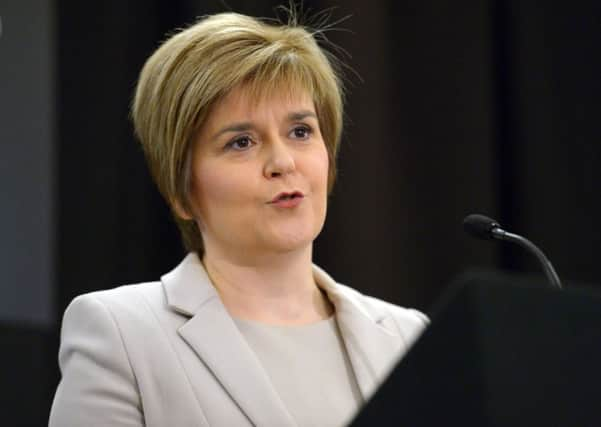Worst UK cuts to hit Scotland by 2016 - report


Deputy First Minister Nicola Sturgeon warned that the cuts will set the fight against poverty back a decade and hit the most vulnerable in society.
But the Westminster government insists the changes are transforming the lives of the poorest and “bringing sense” to the benefits system.
Advertisement
Hide AdAdvertisement
Hide AdScottish welfare spending will fall by about £6 billion over the six years to 2015-16, according to a report published by the Scottish Government.
The majority of the total reduction in welfare expenditure in Scotland, nearly 70 per cent, is expected to be in 2014-15 and 2015-16, says the report entitled UK Government cuts to welfare expenditure in Scotland – Budget 2014 update. The Scottish welfare bill in 2015-16 alone will have been reduced by almost £2.5bn.
The heaviest cuts are in the changes to how benefits are uprated, tax credits and child benefit.
The UK government has embarked on a widespread programme of cuts to the welfare state in an effort to drive down to the UK’s £114bn annual public spending deficit.
Chancellor George Osborne warned in his recent Budget there will be no let-up in the cuts in the years ahead.
This will mean a reduction in support for families, children and those with disabilities, ministers in Scotland warned yesterday.
Ms Sturgeon said: “We are committed to mitigating against the harmful effects of Westminster welfare reforms where we can – but the majority of the cuts are still to come.
“These changes to the Budget will not only impact on the most vulnerable in our society, they will also set our progress on tackling poverty back by at least ten years.”
Advertisement
Hide AdAdvertisement
Hide AdShe added: “We want to develop a society that not only provides fair support and decent opportunities for all but also protects the vulnerable in our society.
“The only way to guarantee that is to have possession of the powers to deliver it. Only then can we finally stop these reforms from harming people who need our help.”
The Child Poverty Action Group (CPAG) has suggested that, after housing costs have been taken into account, 100,000 more children in Scotland will be pushed into poverty by 2020 because of the reforms.
The Trussell Trust, an anti-poverty and marginalisation charity, said the number of people using food banks is increasing, with 56,000 people needing help between April 2013 and February this year.
The cuts have been ongoing since the coalition at Westminster came to power in May 2010. An emergency budget was held in June 2010 heralding the so called “climate of austerity”, as the Chancellor set out swingeing cuts in public spending to deal with the UK’s spiralling national debt, which has since topped £1 trillion.
The welfare state was among the key targets and the cuts were spread across the system, with only pensioners being exempt.
Commenting on the latest report, a spokeswoman for the Department of Work and Pensions last night said the overhaul was needed across all the UK.
She said: “We are creating a fair, affordable and effective welfare system that provides a safety net for people in times of need.
Advertisement
Hide AdAdvertisement
Hide Ad“Our much-needed reforms are about transforming the lives of the poorest in society and bringing sense back to the welfare system – keeping the benefits bill sustainable, so that we can continue to support people when they need it most, right across the UK.
“Our vital reforms are set to save the UK taxpayer £50bn by the end of the current parliament.”
The SNP government has pledged to effectively end the so-called “bedroom tax” after reaching a deal with Labour to fully mitigate its impact on those affected in Scotland.
It wants to do this through discretionary housing payments (DHPs) and finance secretary John Swinney has pledged an extra £12 million to cover the £50m cost to those affected.
This is likely to be agreed by coalition ministers, but the SNP could also adopt a Labour plan to “write off” any arrears run up by tenants as a result of the cut to housing benefit for those deemed to have an extra bedroom.
The Scottish Government report published yesterday also finds that of the £6bn reduction, it is estimated that more than £1bn relates directly to children in Scotland, through tax credit cuts, abolishing the health in pregnancy grant, the abolition of the child trust fund, changes to income support and Child Benefit.
The report adds: “Children are likely to be indirectly affected by other measures such as the housing benefit reforms. The true impact on children is therefore likely to be higher.”
John Dickie, of CPAG in Scotland, said the UK government’s approach to social security is “hugely damaging” for children and families.
Advertisement
Hide AdAdvertisement
Hide AdHe added: “Behind these stark statistics are tens of thousands of children whose childhoods will be harmed, whose education undermined and whose health damaged as increasing numbers of families, both in and out of work, are hit by unprecedented cuts to the value of family benefits and tax credits.”
Scottish Conservative welfare reform spokesman Alex Johnstone said most Scots back the coalition’s approach to welfare reform.
He added: “Most right-minded people would welcome the fact the welfare budget is coming down.
“This rhetoric from the Scottish Government proves it has absolutely no intention of getting to grips with the culture of worklessness which dominates so many parts of Scotland and the wider UK. People in Scotland are supportive of the UK government’s approach to welfare reform.
“What neither the SNP nor Labour can admit is they would have little choice but to adopt the same strategy.
“Their vocal opposition to this matter is for political gain and nothing else.”
Holyrood does not have responsibility for welfare benefits, which are currently controlled by Westminster.
SEE ALSO